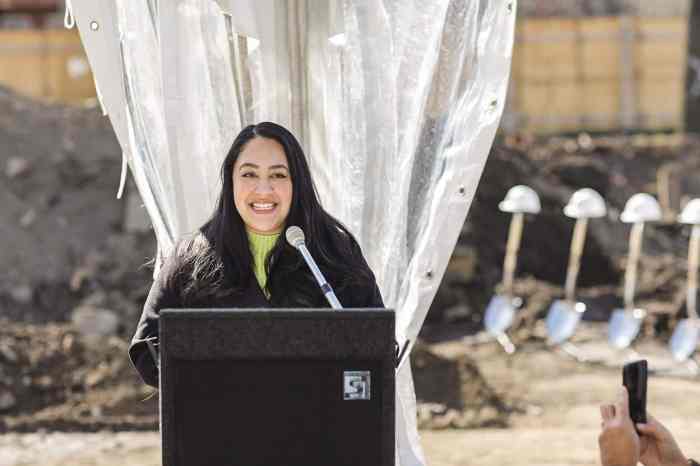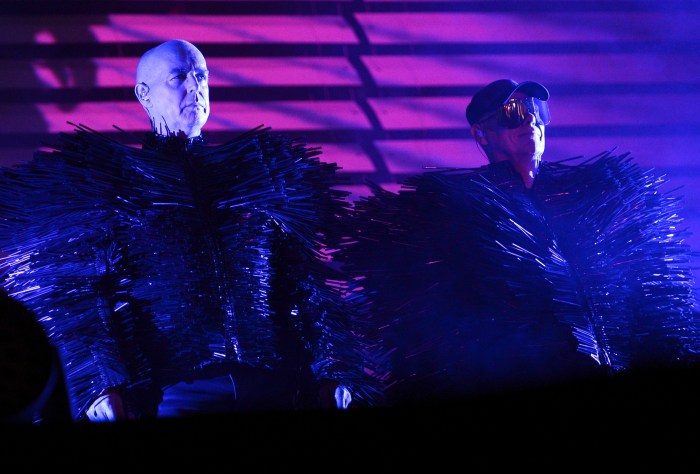Flying circuit queens, queer cops, and manic church ladies
A good half-hour into “Rainy Days & Mondays,” Andrew Barrett’s cloyingly titled play about three friends addicted to circuit parties, I was sure I had it all figured out.
Here is another well-intentioned but cursory Gay Play, I thought, with an appealing male cast and catchy dance tunes, that settles for portraying familiar homo rituals—like changing dance outfits multiple times while snorting drugs and rhapsodizing about the spiritual beauty of thousands of shirtless boys sweating as one on the dance floor. A validation play about—yawn—chucking your real family and choosing your own gay facsimile. A play that relies on the nostalgia factor of the circuit party heyday, circa 1995. Remember when we used to dance to that killer remix? Remember those cute little amber vials drugs used to come in? Remember K-holes?
I figured wrong. Much to my astonishment, the mirror proffered by this buoyant drama soon begins to crack, challenging us to consider much more. Sure, Lenny (Jamyl Dobson) seems like a stereotypically flamboyant black queen, all snaps and smirks, but later, his don’t-mess-with-Mama shell splits wide open to reveal something softer. And David (Benjamin Gabriel), who is on HIV meds and fucks without condoms, is not the selfish, horned-up hunk he purports to be either.
And then there’s the sweet but tortured Brian (Michael Carbonaro), who thinks he’s mourning the loss of his “cute but not smart” lover, Paul (Ander del Rio), who died of AIDS. It’s when Paul, in a stroke of brilliance on Barrett’s part, haunts Brian in the circuit party hotel rooms, that deeper, darker truths are exposed.
The heart-popping production, directed with aplomb by Niegel Smith, is aided immensely by the glistening DR2 Theatre, with its high-octane light and sound systems. The pulsating 1990’s dance soundtrack, designed by world class DJ Randy Bettis, is first-rate.
The simple off-white hotel room set, by Arnulfo Maldonado, features a glass table heaped with enough white power and vials to tease out the party boy in anyone. The room never varies from one scene to the next, suggesting that one extravaganza—the Red Party in Columbus, the Black and Blue Party in Montreal, the Mardi-Gras party in Sydney, etc—is pretty much like any other. A glittering disco ball forever beckons beyond the curtained window.
The lively script is elevated by strong, grounded performances. The 24-year-old Carbonaro, from “Another Gay Movie,” who is profiled in this month’s Out magazine, delivers one of the more intelligently nuanced performances I’ve seen at the Fringe this year. As for Dobson, his frenetic, sweaty coked-up act is enough to give the entire theater a contact high. Of their exploits at Disney Gay Days, he brilliantly deadpans, “You must be this high to get on this ride.”
The startlingly insightful “Rainy Days & Mondays” is about celebrating life, sharing love, the magic of music, and, of course, the limits of hedonism. Yet it falls short of tackling the even-thornier question of “Black Tuesday,” which, as every circuit boy knows, is a thousand times bleaker than any Monday, rainy or not.
“You can’t make this stuff up,” snorts openly gay Michael Tester periodically throughout his bio-play, “Blue Balls: In & Out of Uniform With the NYPD,” now playing at the Flea Theatre.
And it’s a good thing, too, because much of what the former cop describes—his circus-clown parents, issuing his first arrest on Gay Street, fellow cops urinating in his locker, and the cruel lavender wall of silence within the NYPD—sounds like the stuff of fiction but is all too true.
Having graduated with honors from both the American Academy of Dramatic Arts and the New York Police Academy, Tester gamely chronicles how a “faggot coward” tried to straddle these disparate worlds, until their inevitable heart-wrenching collision.
But the 90-minute comedy is more than just a confessional about a gay man’s childhood traumas in gym class, his run-ins with meatheads at the police academy, and that incident with the stubborn street vendor that derailed his career. It’s also, in an odd way, payback time. Because after the “blue knight” sued the NYPD for “institutional homophobia,” he chose a reduced monetary settlement so he could avoid a gag order and be free to tell his story, his way. He’s earned every word of this play, and you can almost see him licking his chops with glee as he dishes the NYPD dirt.
Directed with alacrity by Rye Mullis, “Blue Balls” could have been a standard one-man show, but Tester knew better. He enlisted an energetic supporting cast of three (CJ Dion, Alexandra Bosquet, Vincent Ortega) to portray multiple key characters in his life, and they breathe much-needed pizzazz into the proceedings. Bosquet is especially uproarious as Random Missouri, the drag queen that threw the first brick, or so she claims, in the Stonewall riots in 1969.
Tester has a fine ear for comedy, and many of the jokes hit their target with a zing. On being forced to play dodgeball with fag-bashing brutes, he laments, “That’s why they call it a court, because you’re always being judged.” Before Tester revealed his sexual orientation, his homophobic squad partner boasted of launching “target practice on them there gays.” And this wasn’t some beat deep in the Bronx—it was the 6th Precinct, in the heart of the West Village.
Though some might argue the repeated allusions to “The Wizard of Oz” are woefully hackneyed, they do jibe nicely with the plaintive, “we’re not in Kansas anymore” spirit of the production. Surely taking a cue from his make-‘em-laugh parents, Tester wants nothing more than to entertain as he seeks his rightful place in the world. By recounting his incredible story on stage, he’s found his way home.
Another bio-play, that has ended its run at the Flea, is “The Saints of Festus,” a one-man show written and performed by Scott Hess that, curiously enough, has no male characters in it. Instead, we’re treated to a host of overzealous ladies at an all-night quilting bee in a church basement in Festus, Missouri. These crackpots are on a mission to “quilt to show their faith until their fingers bleed” and raise some cash to save their town, population 166, which has been menaced in recent years by abortion clinics, Wal-Mart, and crystal meth labs.
With only the aid of a simple shawl or tacky pair of glasses, Hess deftly transforms himself into an array of endearing, God-fearing kooks. We meet Mother Love, the pro-life mistress of ceremonies; Dixie McCoy, the fry cook/showgirl; Cicely, the century-old matriarch of Festus; Brini the sinister midget who threatens to blow up the drive-thru abortion clinic; and many others. Throughout the evening, laughs flow as freely as the Schlitz Malt Liquor that the ladies gulp by the caseful as they sew.
The bittersweet comedy is directed with a light touch by David Drake, who knows a thing or two about solo shows with his virtuoso performance in “The Night Larry Kramer Kissed Me” and his direction of another Hess show, “BJ: The Trail of a Transgendered Country Singing Star,” an award winner at the 1999 FringeNYC.
By painting a warts-and-all picture of this woebegone town, Hess exposes the lunacy and hypocrisy of red-state Americans who prefer to hide behind the Bible than to think for themselves. And it has the guts to poke fun at sacrosanct topics, such as the Katrina and Tsunami tragedies.
Yet, despite his skill in portraying these loonies of his hometown, the portrait of Scott Hess the citizen who chose to escape, is strangely unclear.
gaycitynews.com

































